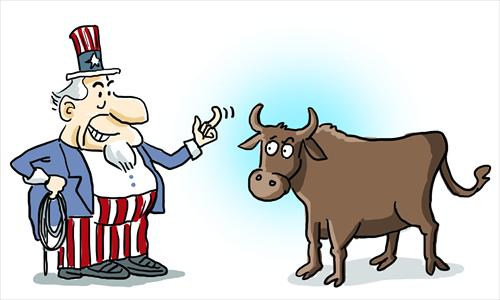West's concern for Ukraine reflects long-standing fears

Illustration: Liu Rui/GT
A specter has been haunting Europe - the specter of an independent, pro-Russia Crimea as a make-or-break case for peace in central Europe.
With more than 96 percent of respondents in the latest referendum favoring joining Russia, Crimea is now in Russia's pocket.
Diplomatic and military posturing aside, Putin-bashing in the West has reached an unprecedented level: Vladimir Putin has been called "Hitler" by Hillary Clinton, "a thug" by John Boehner, and "a KGB colonel who always had ambitions to restore the Russian empire" by John McCain, to mention just a few.
Obama, too, joined the hawks by accusing Russia of violating the Ukrainian constitution, sovereignty, international law, and therefore as being "on the wrong side of history." Welcome to the brave new world of speaking loudly while carrying big sticks.
Putin, the former KGB colonel, may be guilty of all of these evildoings, like a Soviet intelligence agent in a Hollywood movie.
In the Ukraine case, however, it was the violent reaction to Russia's $15 billion aid package and gas price cut, which was actually normal in foreign economic relations, that violated the Ukrainian constitution.
According to the British Channel 4, many of those West-backed street protesters, who overthrew a democratically elected, albeit corrupt, government are members of the neo-Nazi groups including the Svoboda (Freedom) Party, the Right Sector and paramilitary group UNA-UNSO, who fought against Russian troops in Chechnya and Moldova.
Many of them were trained in Ukraine's neighboring countries such as Poland, Lithuania and Turkey, according to the Asian Times on Wednesday.
Ukraine's sovereignty, therefore, was raped repeatedly long before Russia's recent move into Crimea.
Regardless, the current buzzword of sovereignty for Ukraine has been long forgone in the West.
For almost a quarter of a century, the favorable instruments in the West's diplomatic toolbox include humanitarian intervention, regime change, and nation building.
In actuality, they meant the West's armed interventions in many parts of the world, such as Iraq (twice), Somalia, Haiti, Bosnia, Kosovo, Afghanistan, Libya, which have been far more frequent and destructive than the Brezhnev Doctrine of "limited sovereignty" executed for Czechoslovakia in 1968.
Fast forward to the 21st century and little has changed in the West’s selective use of the Wilsonian principles of self-determination and sovereignty in Ukraine. As both sides are escalating the war of words in the middle of war games, did history really “end” 25 years ago with the final victory of Western liberalism, as theorized by Francis Fukuyama’s provocative and naive treatise? If anything, what is going on in Ukraine looks more like a resumption of what US paleoconservative theorist William Lind has called a “Western civil war,” which encompassed 350 years: from the 1648 Treaty of Westphalia to the end of the Cold War in 1991. One wonders if the West has not fought enough after the wars of the merchants of the 17th and 18th centuries, wars of professionals and revolutions of the 18th and 19th centuries, and the “total wars” (WWI and WWII) of the 20th century. One should not forget, of course, those numerous colonial wars the West fought against the non-West, including the two infamous Opium Wars in China.
History, nonetheless, never mechanically repeats itself. At the height of the anti-government protest in Kiev, what troubled the Russians, and perhaps the rest of the world, was the West's almost absentmindedness regarding Russia's legitimate concerns for its security, which quickly switched to shock, helpless and the endless Russophobia now permeating in the West's mainstream media.
The West seems to forget that even George Kennan, architect of the Cold War containment doctrine, recognized Russia's traditional concerns for security after two massive invasions from the West: Napoleon Bonaparte in the 19th century and Adolf Hitler in the 20th century.
The Cold War (1947-89) turned out to be what John Lewis Gaddis called a "long peace," precisely because the two opposing sides respected each other's security concerns, albeit reluctantly and structurally locked by the doctrine of mutually assured destruction.
It is not my intention to glorify the "good old days" of the Cold War. It was a different world with a power equilibrium.
Russia's determined move in Crimea is also a logical response to at least two policies of the West.
Since Russia's overnight transition to democracy and market capitalism in the early 1990s, the West has shoved Russia back into the cold despite repeated efforts by Russian leaders, including Putin himself, to forge closer ties with the West.
Meanwhile, NATO has expanded three times, despite then US president George H. W. Bush's promise to then Soviet leader Mikhail Gorbachev not to enlarge the group.
Putin is known for his almost philosophical statement that "Whoever does not miss the Soviet Union has no heart. Whoever wants it back has no brain." Putin, however, leaves the option open for Russia, which is still the largest landmass in the world. And the Crimean referendum may well be a major step toward Putin's dream of making Russia a strong and respected power in the 21st century.
The author is a senior fellow of the Shanghai Association of American Studies. opinion@globaltimes.com.cn